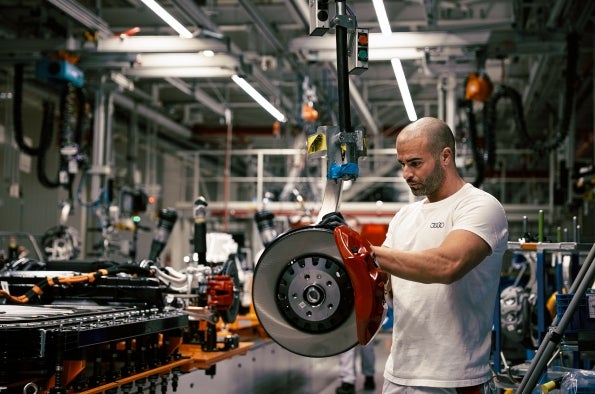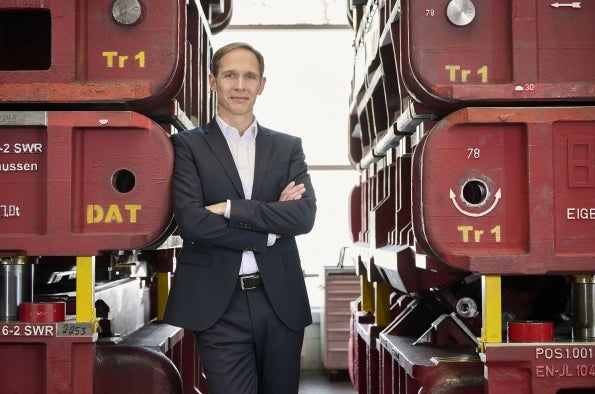
VW Group’s Audi brand has presented its latest strategic plan for electrification, in terms of its product plans and manufacturing infrastructure.
From 2026, the brand will only launch all-electric models onto the global market, gradually phasing out production of its combustion models by 2033. Under its ‘Vorsprung 2030’ corporate strategy, Audi says it is now taking steps to prepare its global facilities for the production of all-electric cars.

Discover B2B Marketing That Performs
Combine business intelligence and editorial excellence to reach engaged professionals across 36 leading media platforms.
Unlike many of its competitors, Audi maintains that it is building on its existing global production network to achieve the transition to e-mobility. “Step by step, we are bringing all our sites into the future,” says Audi Board Member for Production and Logistics Gerd Walker. “We don’t want any standalone lighthouse projects on greenfield sites. Instead, we are investing in our existing plants so they end up being just as efficient and flexible as newly built production sites or greenfield plants.”
According to Walker, this is sustainability in action – in economic, ecological, and social aspects. “The path Audi is taking conserves resources and accelerates our transformation to a provider of sustainable premium mobility,” Walker says.
Audi is striving to make its manufacturing footprint flexible and resilient to make it future-proofed for the long term.
Audi developed its strategy taking various perspectives into account. Walker and his team focused on the following questions: “What does society expect from us? What do our customers demand? What are the expectations of stakeholders, and what will our employees need in the future?” In response to these questions, Audi has created the ‘360factory’. It says the approach places ‘equal emphasis on cost-effectiveness, sustainability, flexibility, and attractiveness’.
An ambitious roadmap
By the end of the decade, Audi will be making electric-drive models at all of its production sites worldwide. “To achieve our goal, we are relying on our highly qualified staff and will make all our employees fit for the future by 2025 with a training budget of around 500 million euros,” says Walker. Two sites, Böllinger Höfe and Brussels, are already producing all-electric vehicles. Starting next year, the Audi Q6 e-tron will be the first all-electric model to roll off the production line in Ingolstadt. Production of all-electric cars is also scheduled to ‘gradually start’ at plants in Neckarsulm, San José Chiapa, and Győr.

By 2029, Audi plans that all production sites will be producing at least one all-electric vehicle model. It also said that ‘depending on local conditions’, production of the remaining combustion models will be gradually phased out by the beginning of the next decade.
Audi says new plants will only be built where additional capacity is needed. For example, Audi and its partner FAW are currently building a site in Changchun (China) where models based on the PPE (Premium Platform Electric) technology platform will be locally produced. With construction set to finish by the end of 2024, this will be the first automotive plant in China where only all-electric Audi models roll off the line.
Transformation as a catalyst for increased productivity
Audi also plans a big gain to productivity as part of the transition to e-mobility. “We will use the transition to e-mobility to make major leaps in productivity and optimization by making the necessary modifications,” says Walker.
It’s an ambitious plan. Audi wants to cut annual factory costs in half by 2033. To achieve this, Audi plans to reduce the complexity of its vehicles where it does not benefit the customer. To this end, vehicle development will take a streamlined production process into account from stage one. It will also continue to digitalize production, for example, with the Edge Cloud 4 Production solution using local servers. This, it is claimed, will make it possible to replace expensive industrial PCs, reducing IT efforts such as software rollouts and operating system changes.
In the future, Audi will also be using another new solution – cycle-independent modular assembly – to simplify work with high product variability. Virtual assembly planning also saves material resources and makes innovative, flexible collaboration possible across locations, Audi maintains.
A flexible manufacturing footprint
To ensure it is able to respond more flexibly to fluctuations in customer demand or production program, Audi will make its manufacturing processes more flexible (with production lines able to handle more variants and models). “We want to structure both product and production so we get the optimum benefit for our customers,” says Walker. To this end, the new Audi Q6 e-tron, for example, will initially be made in Ingolstadt on the same line as the Audi A4 and A5. The electric models will then gradually replace the combustion cars on the lines.
Audi has been pursuing its ‘Mission:Zero’ environmental program to reduce its ecological footprint related to production and logistics since 2019. The program’s central goal is to make all Audi production sites worldwide net carbon neutral by 2025. To this end, the plants in Brussels and Győr as well as the Böllinger Höfe in Neckarsulm have already been converted. The environmental program also addresses the areas of resource and water efficiency as well as the protection and preservation of biodiversity. For example, Audi plans to halve today’s ecologically weighted water consumption value in its production sites by 2035. In 2018, the brand claims Audi México became the world’s first premium manufacturer to produce cars completely wastewater-free. At the Neckarsulm site, a water cycle was set up in a pilot project between the factory and the neighbouring municipal wastewater treatment plant, which – it is claimed – will reduce the demand for freshwater by more than 70 percent.
On its way to becoming a 360factory, Audi is now setting itself even more ambitious sustainability targets related to production. By 2030, the company aims to cut its absolute environmental impact in the areas of primary energy consumption, power plant emissions, CO2 equivalents, air pollutants, local water risk, and wastewater and waste volumes in half, compared with the 2018 figure. Important steps to achieving this goal include generating renewable energy in-house and using innovative technologies to create more circular value chains where resources used are utilized in closed cycles.
‘Attractive’ internally and externally
Audi also says its 360factory concept will also showcase Audi as an attractive employer both internally and externally – particularly within the production function. As part of this commitment, Audi is currently working on concepts for making working hours more flexible, even in areas that are tied to specific shifts. Audi is also making the working environment and break rooms more comfortable for its employees, it says.
To this end, the Audi Production division does not see itself purely as a vehicle manufacturer, but also as a developer of process technology. “We want to be the best employer – for our employees already on board as well as for all applicants, students, and professionals,” says Walker. “Our transformation into the 360factory will require the very best minds, even in disciplines not commonly associated with production, such as electronics and software development.”
As Audi’s first 360factory, the Ingolstadt plant will serve as a blueprint for the transformation of the company’s large-scale production facilities worldwide. The other sites will tackle the transformation step-by-step. “We still have a long way to go,” says Walker. “But the direction we’re headed in and the steps to get there are clear.”
Audi Q8 e-tron production started in Brussels
The Audi Q8 e-tron has started production at Audi’s Brussels plant (formerly a VW plant) that specialises in Audi electric vehicles. Around 160,000 units of Audi’s first electric model made at the plant – the e-tron – have been delivered since 2018.
Since production of the Audi e-tron began, Audi claims it is the world’s first certified carbon-neutral high-volume production plant in the premium segment. The site switched to green power back in 2012. Among other things, Audi Brussels installed one of the region’s largest photovoltaic systems on the plant premises, covering 107,000 square meters. The system generates around 9,000-megawatt hours of power from sustainable energy every year. That’s enough to charge some 90,000 Audi Q8 e-tron units and reduce carbon emissions by 1,881 tons.
The companies that supply the battery cells are obliged to use only renewable energy sources for production. The electric traction motors for production are transported from Hungary to Brussels by green freight. Since May 2022, Audi has been using rail transport on the approximately 1,300-kilometer route, a decision that reduces carbon emissions by around 2,600 tons annually.
Audi AG has owned the Belgium site since 2007. After acquiring it, Audi Brussels converted the plant to produce the Audi A1, a new addition to the Audi model range at the time. 2018 saw the birth of the Audi e-tron.
In 2021, Audi Brussels produced 43,866 all-electric cars. Starting in the second half of 2023, more than 3,000 employees will also make the Audi Q4 e-tron in Brussels.






